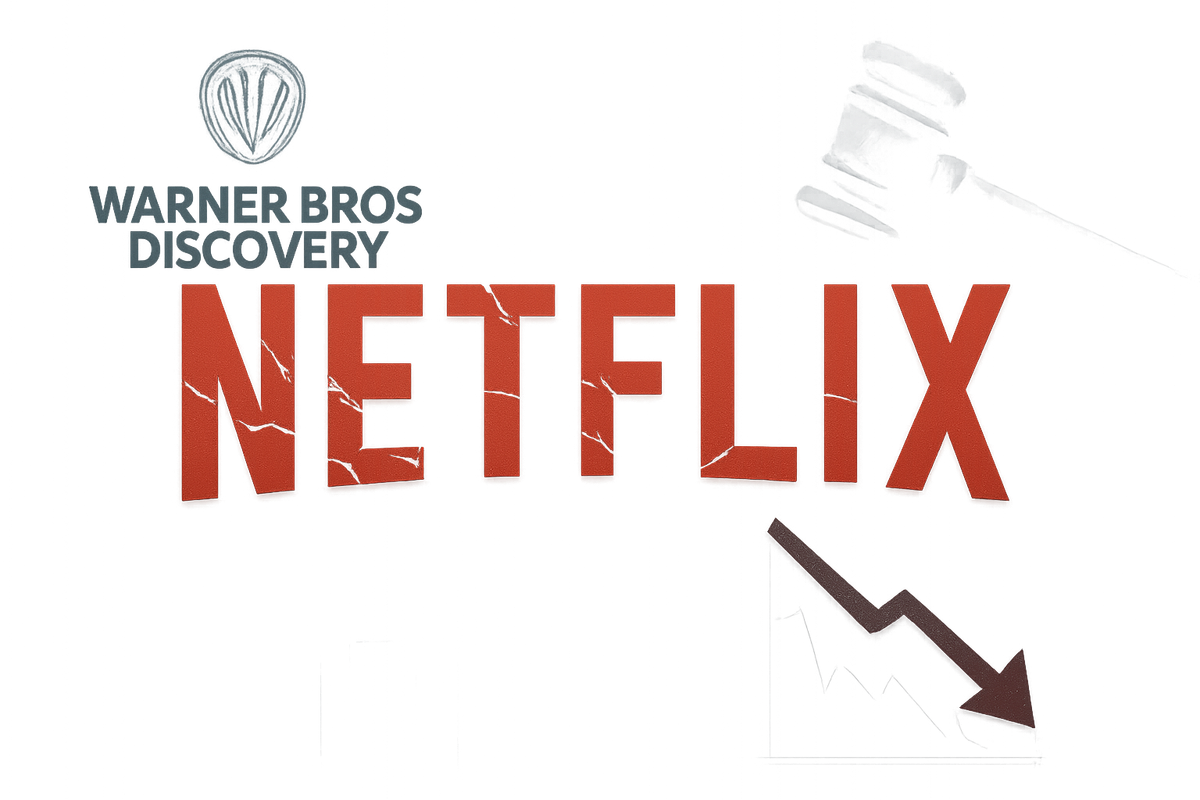Netflix (NFLX) Plunges Amidst Warner Bros. Discovery Acquisition Rumors, Lawsuit, and Analyst Caution

New York, NY – November 20, 2025 – Netflix (NASDAQ: NFLX) found itself at the bottom of the stock market performance charts today, with its shares declining by approximately 3.6% to close around $109.19. The streaming giant's downturn was primarily fueled by a potent mix of market apprehension surrounding its rumored pursuit of Warner Bros. Discovery (NASDAQ: WBD) assets, a newly filed class-action lawsuit, and a chorus of analyst downgrades. This confluence of events has cast a shadow over Netflix's immediate future, leaving investors questioning the company's strategic direction and valuation.
The significant drop reflects a growing unease among shareholders regarding the potential complexities and financial implications of such a massive acquisition, especially in an already saturated and highly competitive streaming landscape. Coupled with concerns over its pricing strategy and a cautious broader market sentiment, Netflix's position as a market laggard today underscores a pivotal moment for the entertainment behemoth.
A Perfect Storm: Acquisition Speculation, Legal Battles, and Analyst Scrutiny
The most immediate catalyst for Netflix's stock decline on November 20, 2025, was the swirling news that the company is reportedly in active discussions to acquire Warner Bros. Discovery's (NASDAQ: WBD) studio and streaming assets. This potential mega-deal has introduced significant uncertainty, with investors grappling with the strategic rationale, the sheer scale of the integration challenge, and the substantial regulatory hurdles such an acquisition would face. Regulators are anticipated to scrutinize the deal's impact on media concentration, consumer choice, and competition within the entertainment industry, potentially delaying or even blocking the merger. While Netflix has reportedly indicated a willingness to honor WBD's theatrical release commitments, skepticism remains regarding a long-term shift away from its streaming-first model.
Adding to the company's woes, a Dutch consumer organization, the Consumer Protection Foundation, filed a class-action lawsuit against Netflix on this very day. The lawsuit alleges that Netflix's consistent price increases – which have reportedly climbed by up to 75% since 2017 – violate European regulations due to a perceived lack of clear and justifiable reasons for these hikes. The foundation is actively encouraging current and former subscribers to join the suit, potentially exposing Netflix to significant financial liabilities in the form of refunds and considerable reputational damage across its European markets.
The negative sentiment was further exacerbated by a series of analyst actions. Barclays recently lowered its price target for Netflix (NASDAQ: NFLX) to $110.00, maintaining an "equal weight" rating, citing valuation concerns after a robust multi-year run. Earlier in the year, Phillip Securities had cut its rating from "hold" to "strong sell" on July 21st, and Zacks Research downgraded Netflix from a "strong-buy" to a "hold" rating on September 1st. These downgrades collectively contribute to a more cautious outlook on the stock's future growth prospects. Furthermore, recent insider selling, including CEO Gregory K. Peters offloading over 20,000 shares worth approximately $2.22 million on November 4th, and other insiders collectively selling 1.53 million shares valued at $175.4 million over the past three months, has also raised investor eyebrows, often interpreted as a lack of confidence from within the company.
Winners and Losers in a Shifting Streaming Landscape
The unfolding situation presents a complex scenario with potential winners and losers across the media and entertainment sectors. For Netflix (NASDAQ: NFLX), a successful acquisition of Warner Bros. Discovery (NASDAQ: WBD) assets could consolidate its position as a content powerhouse, offering an unparalleled library and potentially reducing content licensing costs in the long run. However, the immediate financial burden, integration challenges, and regulatory risks pose significant threats. The class-action lawsuit could result in substantial financial penalties and erode subscriber trust, impacting future growth and profitability.
Warner Bros. Discovery (NASDAQ: WBD), on the other hand, stands to be a clear winner if the acquisition materializes, potentially offloading assets and reducing its considerable debt load. This could provide a much-needed financial injection and allow the company to refocus its strategy. Other streaming competitors, such as Disney+ (NYSE: DIS), Hulu (NYSE: DIS), and Max (NASDAQ: WBD), might initially benefit from Netflix's current struggles and the market's uncertainty, potentially attracting subscribers seeking stability or alternative content. However, a consolidated Netflix with WBD's library could also present a formidable long-term competitor, intensifying the "streaming wars." Content creators and independent studios might face a more concentrated buyer market, potentially impacting licensing deals. Consumers, while potentially gaining access to a vast consolidated library, could also face fewer choices in terms of distinct streaming services and potentially higher prices if market power becomes too concentrated.
Broader Implications: Consolidation, Regulation, and Economic Headwinds
This event fits squarely into broader industry trends of consolidation within the streaming sector, as companies vie for market share and content dominance in the fiercely competitive "streaming wars." The potential Netflix-WBD deal underscores the immense pressure on media companies to scale up their offerings and secure exclusive content to attract and retain subscribers. This trend also highlights the ongoing shift in consumer behavior, with increasing adoption of ad-supported tiers and "subscription cycling" as individuals manage their entertainment budgets amidst economic pressures.
The regulatory and policy implications of such a significant merger are profound. Antitrust bodies globally will likely scrutinize the deal for its potential impact on competition, media diversity, and consumer welfare. Concerns about media concentration could lead to protracted reviews, divestment requirements, or even outright rejection, setting a precedent for future large-scale mergers in the digital entertainment space. Historically, similar large media mergers have faced intense regulatory scrutiny, and the current political climate often favors stricter enforcement of antitrust laws.
Beyond industry specifics, Netflix's downturn is also reflective of broader market trends. The wider stock market, particularly the tech sector, has experienced considerable turmoil, with the Nasdaq composite declining nearly 5% this month. General investor sentiment remains cautious due to ongoing economic uncertainty, persistent inflationary pressures, and questions surrounding future interest rate policies. Concerns about a potential "AI bubble" and the justification of high valuations across the broader tech sector have contributed to a "risk-off" environment, disproportionately impacting growth stocks like Netflix. This macro-economic backdrop exacerbates company-specific challenges, making investors more sensitive to negative news.
What Comes Next: Strategic Pivots and Market Evolution
In the short term, all eyes will be on any official announcements or further leaks regarding the potential Warner Bros. Discovery (NASDAQ: WBD) acquisition. The market will react sharply to confirmation, denial, or any specific terms of a deal. Simultaneously, the class-action lawsuit in the Netherlands will begin its legal proceedings, and any developments or initial rulings could significantly impact Netflix's (NASDAQ: NFLX) stock and reputation. Investors will also keenly await Netflix's Q4 2025 earnings report for insights into subscriber growth, ad-tier performance, and guidance for the coming year, which could either alleviate or intensify current concerns.
Looking further ahead, the long-term possibilities for Netflix hinge significantly on its strategic response to these challenges. If the WBD acquisition proceeds, the company will face the monumental task of integrating vast content libraries, technology platforms, and organizational cultures while managing regulatory oversight. This could lead to a significant strategic pivot towards a more diversified content offering, potentially blurring the lines between traditional studio and streaming operations. Without the acquisition, Netflix will need to double down on its organic growth strategies, potentially exploring further content partnerships or new market expansions to maintain its competitive edge. The outcome of the class-action lawsuit could also force a re-evaluation of its pricing strategies and customer communication practices globally.
Market opportunities could emerge for competitors if Netflix stumbles during this period of uncertainty, allowing them to capture market share. For Netflix, successfully navigating these challenges could solidify its market leadership, but failure could lead to prolonged underperformance. Potential scenarios range from a highly successful integration and market dominance to regulatory roadblocks, significant financial liabilities, and a prolonged period of strategic re-evaluation.
A Critical Juncture for the Streaming Giant
Today's sharp decline in Netflix (NASDAQ: NFLX) stock on November 20, 2025, serves as a stark reminder of the volatile nature of the financial markets and the unique pressures faced by major tech and entertainment companies. The confluence of potential M&A activity with Warner Bros. Discovery (NASDAQ: WBD), a significant class-action lawsuit over pricing, persistent analyst skepticism, and broader economic headwinds has created a perfect storm for the streaming pioneer.
Moving forward, investors should closely monitor several key indicators. The most immediate watch point will be any definitive news regarding the WBD acquisition talks, as this will largely dictate Netflix's strategic trajectory for years to come. Developments in the Dutch class-action lawsuit will also be crucial, as its outcome could have significant financial and reputational ramifications. Furthermore, attention should be paid to Netflix's subscriber growth metrics, particularly for its ad-supported tier, and its ability to manage content costs and maintain profitability in an increasingly competitive environment. The overarching health of the tech sector and global economic conditions will also continue to play a significant role in determining investor sentiment towards growth stocks like Netflix in the coming months. This period represents a critical juncture for Netflix, with its strategic decisions in the near future likely shaping its legacy in the evolving digital entertainment landscape.
This content is intended for informational purposes only and is not financial advice
More News
View More




Recent Quotes
View More
Quotes delayed at least 20 minutes.
By accessing this page, you agree to the Privacy Policy and Terms Of Service.